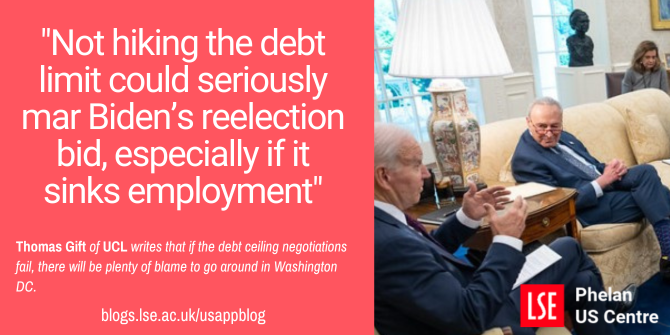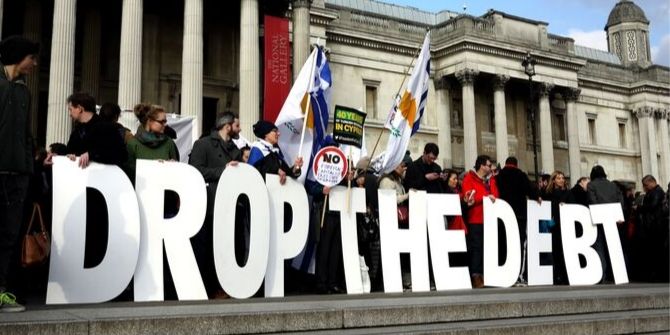 As Washington DC careens closer and closer to reaching the “debt ceiling,” the risks of a US federal government default loom large. Although President Joe Biden and Congressional Republicans continue to negotiate, the two parties appear far apart from reaching a deal. In this Q&A, Thomas Gift explains the significance of the debt ceiling and the political and economic stakes of falling over the fiscal ledge.
As Washington DC careens closer and closer to reaching the “debt ceiling,” the risks of a US federal government default loom large. Although President Joe Biden and Congressional Republicans continue to negotiate, the two parties appear far apart from reaching a deal. In this Q&A, Thomas Gift explains the significance of the debt ceiling and the political and economic stakes of falling over the fiscal ledge.
What’s the long and short of the debt ceiling debate?
The debt ceiling is the maximum permitted limit on borrowing by the US federal government. Right now, it stands at just over $31 trillion, with economists predicting that Washington will hit its spending cap by June 1st. If the limit is reached, it means that the government won’t be able to pay its bills – which it has already committed to – and would default on its loans. That could drive the nation’s economy into a tailspin. The current debate over the debt ceiling is the rare exception where the reality could be worse than the alarm bells suggest. When Treasury Secretary Janet Yellen, for example, warns of a pending “calamity” of a national default, it’s not just partisan scaremongering. After a three-month standoff, Joe Biden and Republican House Speaker Kevin McCarthy are finally talking, at least. So far, conversations have been said to be “productive” (which, for the uninitiated, is inside-the-Beltway speak for: “don’t hold your breath.”) Biden is clinging to his pledge not to entertain budget cuts until Republicans agree to a “clean” increase in the debt ceiling, with no strings attached. Meanwhile, Republicans keep pointing to the fact that House has already passed a debt ceiling bill, albeit one that has zero chance of clearing the Senate or being endorsed by Biden.
Who would take the blame for a default?
In short, everyone would take some of the heat. According a recent Washington Post/ABC News poll, a slight plurality of Americans would blame Republicans more than Democrats for failing to raise the debt limit. That’s encouraging for Biden. But it also belies a broader reality: The president would invariably be scapegoated for the downstream consequences of a default, whether short or long term. An iron law of US elections is that an incumbent gets credit when the economy hums and the blame when it sours. Not hiking the debt limit could seriously mar Biden’s reelection bid, especially if it sinks employment, the one saving grace of the US economy that’s proven resilient post-COVID-19. Estimates, for example, suggest that a protracted failure to raise the debt ceiling could eliminate eight million jobs. A recent survey by Reuters/Ipsos found that more voters cite the economy as the country’s biggest problem now than any other issue. After years of double-digit inflation, which many voters attribute at least partially to the administration’s big spending bills, Biden can’t afford for the economy to become an even sorer spot heading into 2024. That’s one reason why lots of Republicans think that the White House will eventually cave to their demands.

P20230509AS-0929 by The White House is United States government work
Biden keeps saying that the budget should be totally separate from the debt ceiling. Is he right?
Technically, yes. But Biden’s claim ignores an inconvenient truth. Debt ceiling increases been tethered to legislative bills 32 times since the late 1970s. Even more, as Biden knows from his 30-plus years on Capitol Hill, politics in Washington DC has always been the art of the possible—a game that Democrats aren’t above playing. Take 2018, for instance, when then-House Minority Leader Nancy Pelosi whipped up an unsuccessful plot against raising the debt ceiling over the failure of the Trump administration to protect the legal status of undocumented youth immigrants. More than just historical examples, the fact that Republicans have tied the debate over discretionary spending to the debt ceiling can’t have come as a surprise for Biden. Since before the 2022 midterms, Republicans have been telegraphing their intent to leverage the debt ceiling to force Democrats’ hand on cutting spending. However, slight their House majority, a majority is a majority. To expect that they’ll surrender now is unrealistic. Republicans have a narrow window in which to slash discretionary spending. An unrestricted hike to the debt ceiling relinquishes the “nuclear option,” so they perceive now as the time to get what they want.
Even if a deal is struck before the deadline, could there still be costs from inching so close to the fiscal ledge?
Definitely. A last-minute compromise would stave off the worst effects of a default. But history suggests it wouldn’t be costless. In 2011, for example, the last comparable time Washington stepped this close to the fiscal brink, Standard & Poor’s downgraded the US economy’s AAA credit rating. America’s cost of borrowing ticked up by $1.3 billion. At one point, investor jitters led to the S&P 500 stock index plummeting by 17 percentage points within a 22 trading-day period. Goldman Sachs forecasts that falling over the fiscal precipice in 2023 would paralyze 10 percent of all economic activity in the US. Even if it doesn’t hit, just bracing for that meteor-sized impact would rock consumer confidence, disturb an already fragile banking sector, and cause undue harm to the reputation of America’s creditworthiness. The cost of buying insurance against a federal default, for example, is currently the highest it’s been in more than a decade. Given America’s already anemic GDP growth, injecting more uncertainty into financial markets by driving the debt ceiling debate into the eleventh hour would also make the Fed’s job of a “soft landing” that much tougher. Keeping inflation in check, while not propelling the economy into a cooldown, is hard enough without added political dysfunction.
- Please read our comments policy before commenting.
- Note: This article gives the views of the author, and not the position of USAPP – American Politics and Policy, nor the London School of Economics.
- Shortened URL for this post: https://bit.ly/3WfkgPP






